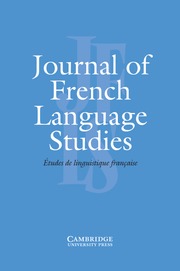Crossref Citations
This article has been cited by the following publications. This list is generated based on data provided by
Crossref.
Charolles, Michel
and
Péry-Woodley, Marie-Paule
2005.
Introduction.
Langue française,
Vol. n° 148,
Issue. 4,
p.
3.
Sarda, Laure
2005.
Fonctionnement des cadres spatiaux dans les résumés de films.
Langue française,
Vol. n° 148,
Issue. 4,
p.
61.
REBEYROLLE, JOSETTE
JACQUES, MARIE-PAULE
and
PÉRY-WOODLEY, MARIE-PAULE
2009.
Titres et intertitres dans l'organisation du discours.
Journal of French Language Studies,
Vol. 19,
Issue. 2,
p.
269.
Chagnoux, Marie
2009.
Informer sans s’engager : modélisation de la dynamique énonciative dans les sujets d’actualité.
Corela,
Dickins, James
2010.
Junction in English and Arabic: Syntactic, discoursal and denotative features.
Journal of Pragmatics,
Vol. 42,
Issue. 4,
p.
1076.
Sarda, Laure
Carter-Thomas, Shirley
and
Fagard, Benjamin
2011.
Présentation du numéro.
Discours,
Welcomme, Aurélie
2011.
Marqueurs cadratifs temporels et argumentatifs dans les récits d’apprenants néerlandophones de français L2.
Discours,
Sarda, Laure
and
Thomas, Shirley Carter
2012.
L'impact de la position phrastique sur les fonctions et valeurs des SP adverbiaux : l'exemple des SP en sur et dans.
Travaux de linguistique,
Vol. n°64,
Issue. 1,
p.
21.
Stosic, Dejan
2012.
Le pouvoir cadratif des compléments introduits par à travers : des cadres de discours pas comme les autres ?.
Travaux de linguistique,
Vol. n°64,
Issue. 1,
p.
55.
Torterat, Frédéric
2012.
Une approche de la diversification discursive chez de jeunes enfants (30-48 mois).
Enfance,
Vol. N° 2,
Issue. 2,
p.
167.
Sarda, Laure
and
Charolles, Michel
2012.
Les adverbiaux prépositionnels : position, fonction et portée présentation du numéro.
Travaux de linguistique,
Vol. n°64,
Issue. 1,
p.
7.
Le Draoulec, Anne
2012.
« Dans la nuit il y a toi. Dans le jour aussi ». Interprétations temporelle et spatio-situationnelle de dans la nuit et dans le jour.
Travaux de linguistique,
Vol. n°64,
Issue. 1,
p.
79.
Stirling, Lesley
2012.
Tense/Aspect Shifting in Kala Lagaw Ya Oral Narratives.
Australian Journal of Linguistics,
Vol. 32,
Issue. 1,
p.
157.
Rhibi, Chokri
2013.
Adverbes de localisation temporelle et enchaînement spatio-temporel : Le cas de dehors et autres expressions apparentées.
Corela,
Hasselgård, Hilde
2014.
Discourse-structuring functions of initial adverbials in English and Norwegian news and fiction.
Languages in Contrast,
Vol. 14,
Issue. 1,
p.
73.
Degand, Liesbeth
Simon, Anne Catherine
Tanguy, Noalig
and
Van Damme, Thomas
2014.
Discourse Segmentation in Romance Languages.
Vol. 250,
Issue. ,
p.
243.
Mathet, Yann
Widlöcher, Antoine
and
Métivier, Jean-Philippe
2015.
The Unified and Holistic Method Gamma (γ) for Inter-Annotator Agreement Measure and Alignment.
Computational Linguistics,
Vol. 41,
Issue. 3,
p.
437.
Hasselgård, Hilde
2016.
Genre- and Register-related Discourse Features in Contrast.
Vol. 87,
Issue. ,
p.
73.
Asher, Nicholas
Muller, Philippe
Bras, Myriam
Ho-Dac, Lydia Mai
Benamara, Farah
Afantenos, Stergos
and
Vieu, Laure
2017.
Handbook of Linguistic Annotation.
p.
1241.
Carruthers, Janice
and
Vergez-Couret, Marianne
2021.
Temporal structures in Occitan and French oral narrative.
Lingvisticae Investigationes
,
Vol. 44,
Issue. 1,
p.
1.




